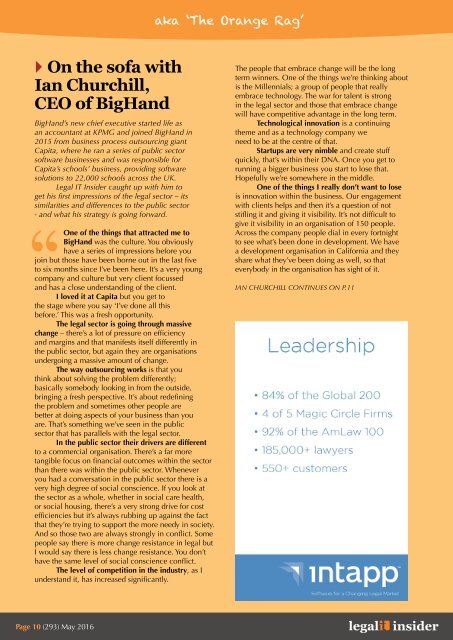Create successful ePaper yourself
Turn your PDF publications into a flip-book with our unique Google optimized e-Paper software.
aka ‘The Orange Rag’<br />
On the sofa with<br />
Ian Churchill,<br />
CEO of BigHand<br />
BigHand’s new chief executive started life as<br />
an accountant at KPMG and joined BigHand in<br />
2015 from business process outsourcing giant<br />
Capita, where he ran a series of public sector<br />
software businesses and was responsible for<br />
Capita’s schools’ business, providing software<br />
solutions to 22,000 schools across the UK.<br />
Legal IT Insider caught up with him to<br />
get his first impressions of the legal sector – its<br />
similarities and differences to the public sector<br />
- and what his strategy is going forward.<br />
One of the things that attracted me to<br />
BigHand was the culture. You obviously<br />
have a series of impressions before you<br />
join but those have been borne out in the last five<br />
to six months since I’ve been here. It’s a very young<br />
company and culture but very client focussed<br />
and has a close understanding of the client.<br />
I loved it at Capita but you get to<br />
the stage where you say ‘I’ve done all this<br />
before.’ This was a fresh opportunity.<br />
The legal sector is going through massive<br />
change – there’s a lot of pressure on efficiency<br />
and margins and that manifests itself differently in<br />
the public sector, but again they are organisations<br />
undergoing a massive amount of change.<br />
The way outsourcing works is that you<br />
think about solving the problem differently;<br />
basically somebody looking in from the outside,<br />
bringing a fresh perspective. It’s about redefining<br />
the problem and sometimes other people are<br />
better at doing aspects of your business than you<br />
are. That’s something we’ve seen in the public<br />
sector that has parallels with the legal sector.<br />
In the public sector their drivers are different<br />
to a commercial organisation. There’s a far more<br />
tangible focus on financial outcomes within the sector<br />
than there was within the public sector. Whenever<br />
you had a conversation in the public sector there is a<br />
very high degree of social conscience. If you look at<br />
the sector as a whole, whether in social care health,<br />
or social housing, there’s a very strong drive for cost<br />
efficiencies but it’s always rubbing up against the fact<br />
that they’re trying to support the more needy in society.<br />
And so those two are always strongly in conflict. Some<br />
people say there is more change resistance in legal but<br />
I would say there is less change resistance. You don’t<br />
have the same level of social conscience conflict.<br />
The level of competition in the industry, as I<br />
understand it, has increased significantly.<br />
The people that embrace change will be the long<br />
term winners. One of the things we’re thinking about<br />
is the Millennials; a group of people that really<br />
embrace technology. The war for talent is strong<br />
in the legal sector and those that embrace change<br />
will have competitive advantage in the long term.<br />
Technological innovation is a continuing<br />
theme and as a technology company we<br />
need to be at the centre of that.<br />
Startups are very nimble and create stuff<br />
quickly, that’s within their DNA. Once you get to<br />
running a bigger business you start to lose that.<br />
Hopefully we’re somewhere in the middle.<br />
One of the things I really don’t want to lose<br />
is innovation within the business. Our engagement<br />
with clients helps and then it’s a question of not<br />
stifling it and giving it visibility. It’s not difficult to<br />
give it visibility in an organisation of 150 people.<br />
Across the company people dial in every fortnight<br />
to see what’s been done in development. We have<br />
a development organisation in California and they<br />
share what they’ve been doing as well, so that<br />
everybody in the organisation has sight of it.<br />
IAN CHURCHILL CONTINUES ON P.11<br />
Page 10 (293) May 2016


